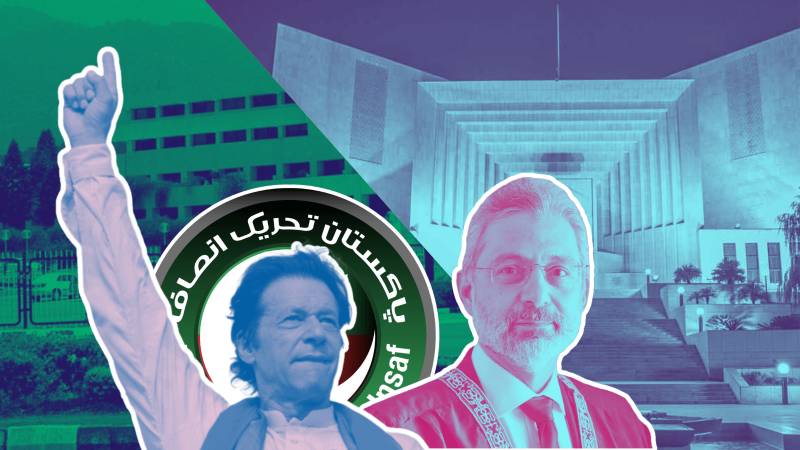
A full court bench of the Supreme Court of Pakistan on Friday declared that the Pakistan Tehreek-e-Insaf (PTI) was a valid political party and allowed the grant of reserved seats for women and minorities proportionate to the general seats the party had secured in the national and provincial assemblies.
The verdict, announced by a majority of 8-5 judges with Chief Justice Qazi Faez Isa in the minority, directed the PTI to submit within 15 days a list of candidates who had contested the February 2024 general elections as PTI candidates and for reserved seats.
Justice Mansoor Ali Shah, who as the senior-most judge among the eight judges in majority, read out the short order which set aside the March 24, 2024, decision of the full bench of the Peshawar High Court (PHC) and declared the March 1, 2024, decision of the Election Commission of Pakistan against granting reserved seats to the Sunni Ittehad Council or the PTI as "ultra vires to the Constitution, without lawful authority and of no legal effect."
The Supreme Court's short order further noted that a notification issued by the ECP on May 13, 2024, declared returned candidates for reserved seats for women and minorities in the national and provincial authorities ultra vires to the Constitution and of no legal effect.
Critically, the majority order seemed to critique the order of a three-judge bench led by the Chief Justice of Pakistan, Qazi Faez Isa, which had declared on January 13 that the PTI could not retain its electoral symbol going into the February 2024 general elections simply because it had failed a key tenet of law where it was required to hold intra-party elections as per the party's Constitution. The Supreme Court's order on Friday noted that the lack of or denial of an election symbol does not in any manner deny the constitutional and legal rights of a political party to participate in an election, whether general or by-elections and feel the candidates and (election) commission are under a constitutional duty to apply all statutory provisions equally.
"PTI was and is a political party," the court said.
The court further declared that of the 80 candidates claiming to be backed by PTI, only 39 were shown by the commission to have filed their nomination papers as PTI candidates or with PTI's official ticket. Thus, these 39 seats were and are the returned candidates of PTI and have secured seats for the party.
The court further granted the PTI 15 days to submit requisite notarised documents certifying that the remaining 41 candidates too had contested the general elections on behalf of the PTI. The commission will then seek confirmation from the PTI about these candidates. These seats will be awarded to the PTI in the respective assemblies if confirmed.
The eight judges who held that PTI should be given reserved seats included Justice Mansoor Ali Shah, Justice Muneeb Akhtar, Justice Muhammad Ali Mazhar, Justice Ayesha Malik, Justice Athar Minallah, Justice Syed Hassan Ali Rizvi, Justice Shahid Waheed, and Justice Irfan Saadat Khan.
The court further ordered that the Sunni Ittehad Council does not fulfill the conditions to be recognised as a political party in assembly and thus cannot be allocated reserved seats for women and minorities. The PTI, however, does fulfill the conditions for a political party and can be allocatd reserved seats.
CJP's minority order
In his minority order, Justice Jamal Khan Mandokhail and Chief Justice Qazi Faez Isa held that the SIC did not contest the general elections as a political party.
He further said that the ECP had incorrectly interpreted the January 13 verdict of the Supreme Court regarding the intraparty elections of PTI and declared candidates who had filed nomination papers as PTI candidates with PTI affiliation certificates as independent candidates. "The ECP had no authority to declare validly nominated candidates of a political party to be independent candidates."
CJP Isa said that candidates who had once declared themselves members of a political party could not declare themselves independent candidates after the last date for withdrawing candidature.
The top judge noted that neither the PTI nor any candidate approached the Supreme Court or high courts challenging the ECP's decision to challenge their declaration as independent candidates.
CJP Isa continued that if any candidate had filed nomination papers as a PTI candidate and had not submitted documents showing affiliation with any other political party by the last date of filing nomination papers, they should have been treated by the ECP as a member of the PTI parliamentary party. But the needful was not done by the ECP.
"Consequently, the PTI, as a parliamentary party, is entitled to reserved seats."
He noted that the ECP should recalculate and reallocate the reserved seats.
"We must ensure that words are not read into the Constitution nor to ascribe artificial meanings to commonly understood words. We must ascribe to validly enacted laws and must not do anything to hinder or facilitate a political party by ignoring the law's mandate.
PTI demands resignation of ECP chief
Speaking to the media outside the Supreme Court after the verdict was read out in open court, the PTI extended a demand for the ECP Chairman Sikandar Sultan Raja to resign as they termed the majority verdict a victory for the party and its founder, Imran Khan.
PTI Chairman Barrister Gohar Khan said that while they have reached their target of securing reserved seats, they were still struggling for their rightful share of seats per Forms 45/47.

